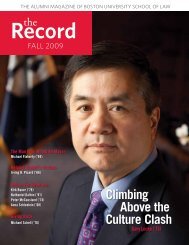the nature of representation: the cherokee right ... - Boston University
the nature of representation: the cherokee right ... - Boston University
the nature of representation: the cherokee right ... - Boston University
You also want an ePaper? Increase the reach of your titles
YUMPU automatically turns print PDFs into web optimized ePapers that Google loves.
2005] THE NATURE OF REPRESENTATION 113<br />
treaty at all, because not sanctioned by <strong>the</strong> great body <strong>of</strong> <strong>the</strong> Cherokee people.” 118<br />
Regardless <strong>of</strong> <strong>the</strong> range <strong>of</strong> numbers one accepts, it is clear <strong>the</strong> negotiations did not<br />
incorporate a significant number <strong>of</strong> Cherokees relative to <strong>the</strong> number bound by <strong>the</strong><br />
Treaty. 119<br />
a. Power <strong>of</strong> <strong>the</strong> Cherokee Leaders<br />
The stated democratic idea governing <strong>the</strong> negotiation form was largely based on<br />
U.S. fear <strong>of</strong> <strong>the</strong> Cherokee leadership’s power. Schermerhorn explains <strong>the</strong><br />
Cherokees’ antagonism to removal with <strong>the</strong> convenient statement: “I also found it<br />
was impossible to obtain a fair expression <strong>of</strong> <strong>the</strong> sentiments <strong>of</strong> <strong>the</strong> people, while<br />
overawed by <strong>the</strong>ir leaders.” 120<br />
An “unfair” expression would, under<br />
Schermerhorn’s logic, be one rejecting <strong>the</strong> premise that <strong>the</strong> Cherokees must move<br />
for <strong>the</strong>ir own good, explainable only by blaming <strong>the</strong>ir leaders. Wilson Lumpkin<br />
argued that most Cherokees were “dupes” <strong>of</strong> Ross, 121 and later added, “[i]n truth,<br />
nineteen-twentieths <strong>of</strong> <strong>the</strong> Cherokees are too ignorant and depraved to entitle <strong>the</strong>ir<br />
opinions to any weight or consideration.” 122 Although Mason’s talk to <strong>the</strong><br />
Cherokee council in 1837 came as part <strong>of</strong> an effort to enforce <strong>the</strong> New Echota<br />
Treaty, <strong>the</strong> expressed sentiment that <strong>the</strong> Cherokee leaders were leading <strong>the</strong>ir people<br />
astray is <strong>the</strong> same: “Listen not to those who tell you to oppose <strong>the</strong> benevolent<br />
designs <strong>of</strong> <strong>the</strong> Government. They are wicked men; They speak with a forked<br />
tongue, and <strong>the</strong>ir bad advice would lead to your inevitable ruin.” 123<br />
Fear <strong>of</strong> Cherokee leadership shaped <strong>the</strong> United States’ stated affinity for popular<br />
participation in negotiations, though not participation through <strong>the</strong> government<br />
established by <strong>the</strong> Cherokees. Schermerhorn appealed to Cherokees to attend New<br />
Echota individually by writing to <strong>the</strong>m that “<strong>the</strong> commissioners cannot treat with<br />
any executive council and national counselors and committee, but only with <strong>the</strong><br />
118<br />
Letter from William Davis to Lewis Cass, Sec. <strong>of</strong> War (March 5, 1836), in LETTER<br />
OF MAJ. DAVIS,RELATIVE TO THE CHEROKEE TREATY, AND THE ACCOMPANYINGCERTIFICATES, 24th Cong., 1st Sess., 2-8 at 3. Contra Letter from J. F. Schermerhorn, U.S.<br />
Commissioner, to Lewis Cass, Sec. <strong>of</strong> War (Mar. 3, 1836), in TREATY WITH THE CHEROKEE<br />
INDIANS, 24th Cong., 1st Sess., 46-49.<br />
119<br />
One estimate placed <strong>the</strong> number bound by <strong>the</strong> Treaty at roughly 2,000 people:<br />
“About sixty leaders signed, representing perhaps two thousand out <strong>of</strong> 16,000<br />
Cherokees. To Ross and his party, <strong>the</strong> treaty was such a patent fraud that <strong>the</strong>y did not<br />
believe <strong>the</strong> Senate would have <strong>the</strong> audacity to ratify it. He was wrong.” WILLIAM G.<br />
MCLOUGHLIN,CHAMPIONS OF THE CHEROKEES: EVAN AND JOHN B. JONES 136 (1990).<br />
120<br />
Letter fromJ.F. Schermerhorn, U.S. Commissioner, to Lewis Cass, Sec. <strong>of</strong> War (Mar.<br />
3, 1836), in TREATY WITH THE CHEROKEE INDIANS, 24th Cong., 1st Sess., 54.<br />
121<br />
Letter from Wilson Lumpkin to Col. William N. Bishop (Aug. 16, 1835), in 1<br />
LUMPKIN, supra note 3, at 361.<br />
122<br />
Letter from Wilson Lumpkin to President Andrew Jackson (Sep. 24, 1836), in 2<br />
LUMPKIN, supra note 3, at 45.<br />
123<br />
J. Mason, Jr., Address to <strong>the</strong> Cherokee nation in generalcounsel assembled, supra<br />
note 96, at 34.









